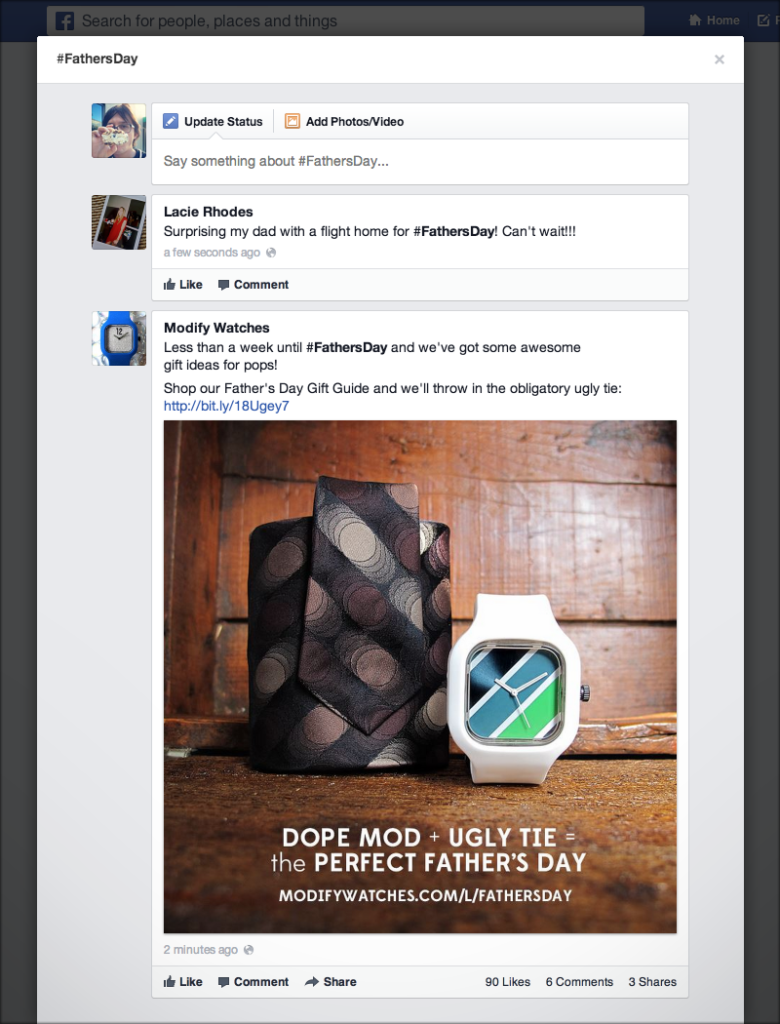
After months of speculation that the hashtag would make its way to Facebook, the pound sign has arrived at last. Hashtags have long existed on Twitter, and more recently debuted on Google Plus, Pinterest and Instagram.
According to a blog post from Facebook, they introduced this feature as “a way for people and businesses to discover and engage in…conversations.” The post goes on to say that “over time our goal is to build out additional functionality for marketers including trending hashtags and new insights so that you can better understand how hashtags fit into your overall Facebook advertising strategies and drive your business objectives.”
Hashtags will appear in post and comments. As seen below, when you click on a hashtag a separate window pops up to show the conversation. You’ll also be able to search for hashtags using Facebook’s search bar.

In the first phase of the rollout, hashtags will only be available to about 20% of Facebook users, and the advertiser benefits will not yet be implemented. Eventually though the hope is that hashtags will be something of a cross-platform promotion tool. “If you are already using hashtags in an advertising campaign through other channels, you can amplify these by including your hashtags in Facebook advertising,” the Facebook Studio post reads.
So there you have it, hashtags framed as a social superpower that links commercials to Twitter to Facebook to search. But let’s talk about two reasons why this function might take after good old Facebook Notes, Facebook Lists and Facebook Home and you know…flop.
1. Most Facebook posts are private
Hashtags work well on Twitter because most people tweet publicly. This way, individuals and brands can see and participate in global conversations, starting a dialogue with people that they probably wouldn’t have reached otherwise. On Facebook, on the other hand, most people post privately. This means that when I use a hashtag, people and brands outside my network won’t be able to see it, and that aforementioned “larger conversation” will rarely exist.
2. People don’t use hashtags the way we want them to
Here’s the thing about language and technology: people don’t always use it the way it was originally intended to be used. That’s not necessarily a bad thing — in fact, this is how language and technology evolve. But the way that hashtags are supposed to work (technically being a form of metadata tag) and they way that they most benefit marketers, is as an organizational tool. Some people (read: marketers, techies) do use hashtags in this “intended way” — to participate in linked, sometimes even global conversations about events like the #StanleyCup or talk about last week’s episode of #MadMen.
But what I see a lot, especially on the pre-hashtag enabled Facebook, is people using the hashtag in other ways. For one, hashtags were rampant on Facebook long before they actually functioned as clickable links. Here are a few of the other “mis-uses” that, while excellent for snarky Web comments and general obnoxious-ness, won’t do marketers a whole lot of good.
- As a parody of itself
- To add emphasis to a word or phrase
- To imply sarcasm
- To turn a sentence into an incoherent mess with no spaces
Are you one of the lucky few who have Facebook hashtag access already? What do you think so far? Will brands reap the benefits, or do you agree that this is one more Facebook feature that will fizzle?